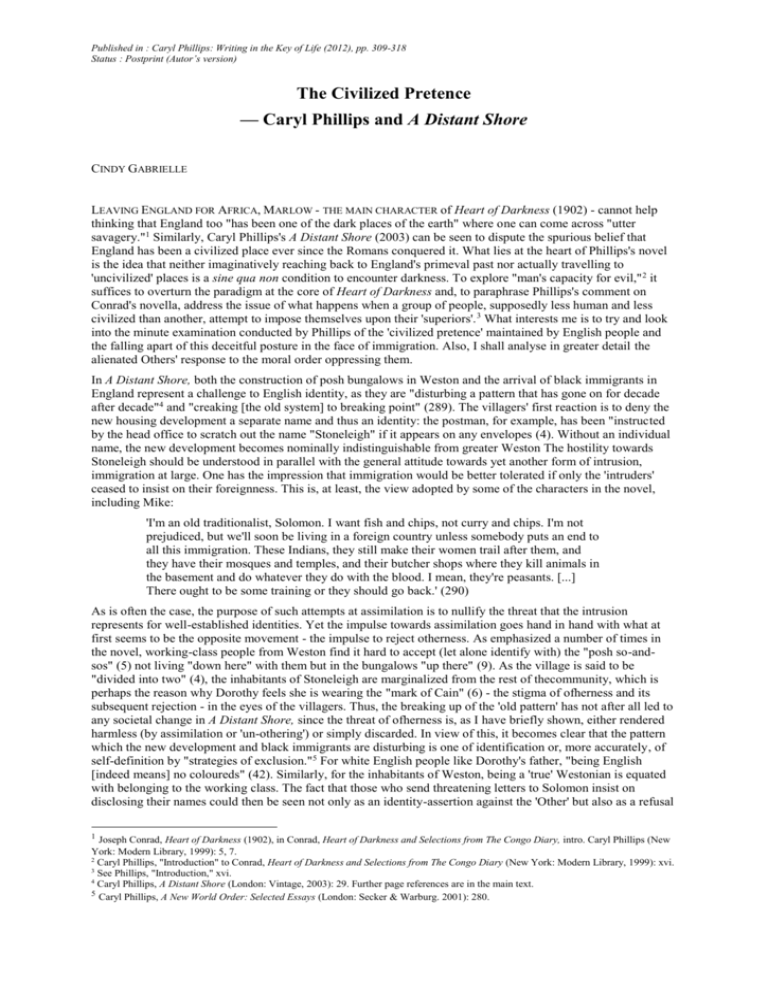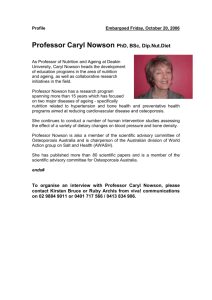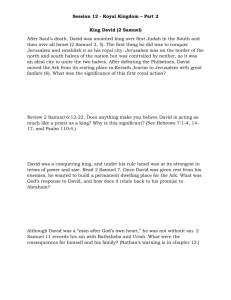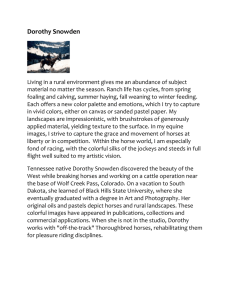GABRIELLE_The Civilized Pretence
advertisement

Published in : Caryl Phillips: Writing in the Key of Life (2012), pp. 309-318 Status : Postprint (Autor’s version) The Civilized Pretence — Caryl Phillips and A Distant Shore CINDY GABRIELLE LEAVING ENGLAND FOR AFRICA, MARLOW - THE MAIN CHARACTER of Heart of Darkness (1902) - cannot help thinking that England too "has been one of the dark places of the earth" where one can come across "utter savagery."1 Similarly, Caryl Phillips's A Distant Shore (2003) can be seen to dispute the spurious belief that England has been a civilized place ever since the Romans conquered it. What lies at the heart of Phillips's novel is the idea that neither imaginatively reaching back to England's primeval past nor actually travelling to 'uncivilized' places is a sine qua non condition to encounter darkness. To explore "man's capacity for evil," 2 it suffices to overturn the paradigm at the core of Heart of Darkness and, to paraphrase Phillips's comment on Conrad's novella, address the issue of what happens when a group of people, supposedly less human and less civilized than another, attempt to impose themselves upon their 'superiors'. 3 What interests me is to try and look into the minute examination conducted by Phillips of the 'civilized pretence' maintained by English people and the falling apart of this deceitful posture in the face of immigration. Also, I shall analyse in greater detail the alienated Others' response to the moral order oppressing them. In A Distant Shore, both the construction of posh bungalows in Weston and the arrival of black immigrants in England represent a challenge to English identity, as they are "disturbing a pattern that has gone on for decade after decade"4 and "creaking [the old system] to breaking point" (289). The villagers' first reaction is to deny the new housing development a separate name and thus an identity: the postman, for example, has been "instructed by the head office to scratch out the name "Stoneleigh" if it appears on any envelopes (4). Without an individual name, the new development becomes nominally indistinguishable from greater Weston The hostility towards Stoneleigh should be understood in parallel with the general attitude towards yet another form of intrusion, immigration at large. One has the impression that immigration would be better tolerated if only the 'intruders' ceased to insist on their foreignness. This is, at least, the view adopted by some of the characters in the novel, including Mike: 'I'm an old traditionalist, Solomon. I want fish and chips, not curry and chips. I'm not prejudiced, but we'll soon be living in a foreign country unless somebody puts an end to all this immigration. These Indians, they still make their women trail after them, and they have their mosques and temples, and their butcher shops where they kill animals in the basement and do whatever they do with the blood. I mean, they're peasants. [...] There ought to be some training or they should go back.' (290) As is often the case, the purpose of such attempts at assimilation is to nullify the threat that the intrusion represents for well-established identities. Yet the impulse towards assimilation goes hand in hand with what at first seems to be the opposite movement - the impulse to reject otherness. As emphasized a number of times in the novel, working-class people from Weston find it hard to accept (let alone identify with) the "posh so-andsos" (5) not living "down here" with them but in the bungalows "up there" (9). As the village is said to be "divided into two" (4), the inhabitants of Stoneleigh are marginalized from the rest of thecommunity, which is perhaps the reason why Dorothy feels she is wearing the "mark of Cain" (6) - the stigma of ofherness and its subsequent rejection - in the eyes of the villagers. Thus, the breaking up of the 'old pattern' has not after all led to any societal change in A Distant Shore, since the threat of ofherness is, as I have briefly shown, either rendered harmless (by assimilation or 'un-othering') or simply discarded. In view of this, it becomes clear that the pattern which the new development and black immigrants are disturbing is one of identification or, more accurately, of self-definition by "strategies of exclusion."5 For white English people like Dorothy's father, "being English [indeed means] no coloureds" (42). Similarly, for the inhabitants of Weston, being a 'true' Westonian is equated with belonging to the working class. The fact that those who send threatening letters to Solomon insist on disclosing their names could then be seen not only as an identity-assertion against the 'Other' but also as a refusal 1 Joseph Conrad, Heart of Darkness (1902), in Conrad, Heart of Darkness and Selections from The Congo Diary, intro. Caryl Phillips (New York: Modern Library, 1999): 5, 7. 2 Caryl Phillips, "Introduction" to Conrad, Heart of Darkness and Selections from The Congo Diary (New York: Modern Library, 1999): xvi. 3 See Phillips, "Introduction," xvi. 4 Caryl Phillips, A Distant Shore (London: Vintage, 2003): 29. Further page references are in the main text. 5 Caryl Phillips, A New World Order: Selected Essays (London: Secker & Warburg. 2001): 280. Published in : Caryl Phillips: Writing in the Key of Life (2012), pp. 309-318 Status : Postprint (Autor’s version) to accept that the old ways of identification are no longer valid in a society where, as Solomon's case exemplifies, one can be black but nonetheless a British citizen. These attempts to preserve a 'pure' English/working-class identity and traditional identification patterns at all costs are certainly at odds with the image of England as a nation of progress, but what the author underlines in A Distant Shore is the loss that this "closure" implies (29). Significantly, the disappearance of Mahmood and Solomon (those who represent 'otherness' in cultural terms) from Dorothy's life means that she loses a connection with "something that existed beyond the narrow scope of her own predictable world" (218) - which, incidentally, makes her realize how claustrophobic England is (see 64 and 266). It goes without saying that, on account of the more or less generalized endeavour to preserve the cultural and social status quo, England/Weston is anything but a place of new beginnings; rather, it is a dead end.6 How this is compatible with Dorothy's and Solomon's search for a safe haven should become clear in what follows. The transformation of Solomon's future house - initially a storage hut -into something "that blended in" (280) with the other bungalows of Stone-leigh is quite symptomatic of a society wanting no hybridization. Another obvious example is that of the Epstein family, who "didn't last long" (8) in Weston, probably because their Jewishness was too visible but also because their exoticism could not be 'reduced' to allow them to blend in - for, unlike huts, people can prove unadaptable. As the pub landlord explains, 'Nobody cares much [for Jews] in the town, but around here they don't blend in. I mean, Rachel and Jacob [the Epstein children]. They weren't even trying.' (9) Many passages in the book actually give the impression that, mutatis mutandis, English citizens act as custom officers would - they scrutinize their border attentively so as to spot and quickly remove possible threats to the nation. Almost all the characters of the novel are in one way or another under close scrutiny and, should they show deviant behaviour, then they are likely to receive advice on how to get back onto the right path. For example, Dorothy is warned by her colleague Sally that " ' tongues are wagging' " about her and that the other teachers are beginning to think that she feels " ' too grand' " to mix with them (227), meaning that Dorothy really ought to change her attitude. Again, this brings us back to the connections between Conrad and Phillips, insofar as Heart of Darkness is concerned with man's response to chaos when he is "released from the moral order of society,"7 whereas A Distant Shore is committed to the alienated Other's response to civilization, when s/he is administered heavy doses of the procrustean treatment pertaining to any oppressive moral order. The weight of people's eyes (which Solomon clearly feels the night he encounters Mike, 274) is so omnipresent in the sections of A Distant Shore set in England that it is, to start with, no wonder if many characters feel compelled to find places, refuges, where there is no need "to watch [one's] p's and q's," as Dorothy's father puts it (13). Solomon's bungalow in Stoneleigh obviously represents for him this kind of refuge from society's watchful eyes, hence his insistence that people should not be able "to look in at [him]" and his satisfaction with the "further protection" that the "plastic window blind" gives him (283). However, despite the new window blind, passers-by are still able to take a peep at the interior of Solomon's bungalow (14), which indicates that the protections sought by the characters against the weight of people's eyes are illusory. To find a sense of peace, what choice is there left for individuals under scrutiny but to reject all societal norms? If becoming homeless is one possible manifestation of such resistance, one understands why Dorothy's staring at a homeless man prompts him to burst out: "'you can't hurt me anymore [...] you can't hurt me'" (12). As we know from the context of the novel, Dorothy had never seen, let alone mistreated, this man before in her life, which means that his cry is directed less at Dorothy as an individual than at the rules of an oppressive society, which she at times enforces even though she also falls victim to them. The irony here is that if the homeless man had truly become indifferent to society's ways and judgments, then he would not cry out against Dorothy. In Solomon's and Dorothy's cases, the close scrutiny to which they are exposed obviously results in their being labelled as 'Other' (Solomon for his skin colour and Dorothy for her eccentric behaviour), and eventually both are wiped off the landscape: Solomon is killed, while Dorothy is put away in a mental institution. But of course, the inhabitants of Weston will not readily acknowledge that their keenness to erase otherness actually reveals their darkness; that they can be oppressors or even murderers. A closer look at the pub landlord's views concerning the treatment of the Epstein family makes it clear that villagers are not to blame for making their lives a misery, but that the real culprits are the family themselves, since "they weren't even trying [to adapt]" (9). As for Solomon's murder, the landlord's reaction is one of denial. As he explains to Dorothy, her friend's death 'must have been an accident because there's nobody in Weston who would do anything like that. [... ] If you've lived here as long as I have, love, and you've grown up with 6 And, as Bénédicte Ledent says, "this absence of movement is also conveyed by the cul-de-sac in which Dorothy and Solomon live." Ledent, " ' Of, and not of, this Place': Attachment and Detachment in Caryl Phillips' A Distant Shore," Kunapipi 26.1 (2004): 157. 7 Caryl Phillips, "Introduction," xvi. Published in : Caryl Phillips: Writing in the Key of Life (2012), pp. 309-318 Status : Postprint (Autor’s version) folks like these, you'd understand that there's not one among them capable of harming anybody. That's just how they are. Decent folk committed to their families and their community [...].' (48-49) But there is no denying the fact that Solomon has been murdered, which means that some of the villagers, particularly the youths who had been harassing Solomon, cannot qualify as "decent" Westonians. The question we might ask ourselves here is whether or not the 'arrival of darkness', of persecution and murder in England, can be attributed to a loss of decency on the part of these young people, which would be in keeping with Dorothy's statement that "without manners we're no better than animals" (311). Yet the text itself undermines the pub landlord's and Dorothy's belief that decency is a safeguard against savagery. It is, for instance, crucial that, despite her very decent behaviour, Dorothy should end up in jail for attacking a homeless woman. As for Solomon, the only gentleman Dorothy ever knew, he committed crimes in Africa when he was still known as Gabriel, notably against his former employer and friend Felix. Although Felix belonged to the ruling tribe, he "never displayed any prejudice against those, like Gabriel, whose blood marks them off as the nominal enemy" (89). Moreover, he did not hesitate to provide Gabriel/Solomon with money to leave the country. But, since what Felix offered was not enough for his friend, Gabriel brutally killed and then robbed him (89-92). These examples suggest that good manners can function as masks hiding one's real past or one's prejudices. This implies, too, that the rejection of any civilized pretence by the younger generations cannot be said to coincide with any 'arrival of darkness' in England. As I pointed out earlier, darkness has always been there, but it is simply more visible without the decorum of good manners. That a shift from covert to openly expressed racism has occurred in English society becomes apparent when comparing Solomon's first passenger as a volunteer driver, "an elderly man [...] [whose] body exudes an unfortunate odour" (298), with the "abusive youngster" (241) making a fuss to be allowed to take his bike aboard a bus while Dorothy waits for its departure. When Solomon's elderly passenger is forced to accept the help of a black man, he stares at his driver but says nothing (298). The man's brooding silence stands in stark opposition to the flow of insults that the young man directs at the bus driver. But, whether or not frustration or racist feelings are voiced or enacted, they exist regardless of any generational gap. Up to this point I have focused on Phillips's representation of England as a dead end, wanting no cultural or class mixing. Even though the characters of the book remain on the whole very passive, as if overwhelmed by a society marginalizing them, it might be suggested that the author himself, in many ways, offers textual resistance to society's crushing force and in so doing redeems his characters' passivity. In the first section, any information relating to Solomon's skin colour is conspicuously un-salient (Dorothy, indeed, puts more emphasis on his good manners), perhaps as should ideally be the case -that is, if society were colour-blind. Further, his English is impeccable, he has never had the habit of "sweating away" (186) his problems through dancing or singing, and he is said to "[fit] in with how he behaves about everything" (14). Solomon's lack of exoticism arguably functions to blur the division between the typical English gentleman and the 'colourful' stranger, so that the character resists classification into the latter category. Dorothy, for her part, is obsessed with maintaining her respectability and dignity, which however, she flouts, without even realizing it, when she harasses Geoff or patronizes Mah-mood's wife. For all her flawless manners, Dorothy is clearly an unreliable narrator, but as it is only gradually revealed that she suffers from mental problems, her classification as an atypical Englishwoman is rendered rather complicated. By focusing on an immigrant man and a mentally ill woman, Phillips casts light on the lives of those whom society usually leaves aside, those who "may as well have been living on the dark side of the moon" (59). Thus, not only does the author problematize the marginalization of Dorothy and Solomon, but he also counters it by making their lives central to his narrative – in Petra Tournay's words, "Phillips pursues the project of re-writing and recreating 'hidden histories'."8 Of course, it will not do to discuss the strategies of textual resistance to society's ostracizing force in A Distant Shore without mentioning the novel's universal quality. The many similarities between the fates of a black immigrant, a (mentally ill) woman, Jews, and homeless people indeed suggest that all these characters share a common history, a history of suffering. This, in fact, is a typical feature of Phillips's fiction, perhaps because, as Helen Thomas points out, the author concentrates upon the intersecting histories of [Africa, Europe and America], and responds creatively and critically to the psychological effects of fragmentation, cultural dispersal, racism and economic exploitation. 9 So, in A Distant Shore, suffering not only links the disparate patterns of Dorothy's music but also links together people coming from different places or backgrounds who, at first sight, may not seem to have much in common. 8 Petra Tournay, "Re-Telling the Past: Metafiction in Caryl Phillips's Diasporic Narratives," in Bridges Across Chasms: Towards a Transcultural Future in Caribbean Literature, ed. Bénédicte Ledent (Liège: L3-Liège Language and Literature, 2004): 91. 9 Helen Thomas, Caryl Phillips (London: Northcote, 2006): 2. Published in : Caryl Phillips: Writing in the Key of Life (2012), pp. 309-318 Status : Postprint (Autor’s version) Arguably, Phillips's all-inclusiveness contrasts starkly with the claustrophobic society depicted in the novel, but also redeems it: England is connected to the rest of the world, if only because suffering is universal and knows no class, gender or racial boundaries. The other common point between immigrants, Jews, the homeless, and the sick is that a society's response to their presence, if this society is predominantly violent or ostracizing, has the effect of unmasking its otherwise hidden darkness. When listing the type of events that epitomize man's, or society's, inner predisposition to darkness, warfare automatically comes to mind. Even though the England described in the novel is not literally at war, the point is that there are similarities between a conflict-ridden country in Africa and an England confronted with immigration. As Paul Gilroy observes, the process of black settlement has been continually described in military metaphors which offer war and conquest as the central analogies for immigration. The enemy within, the unarmed invasion, alien encampments, alien territory and new commonwealth occupation have all been used to describe the black presence in this way.10 The dangerousness ascribed to black settlers, however, is at odds with the emphasis that is laid on Solomon's meekness in the sections of A Distant Shore set in England. In moving from Africa to England, Solomon does not become a conqueror; on the contrary, he loses all agency. That much becomes clear if one looks at the image of the bird in the novel. According to Carla, Dorothy's pupil, Solomon's last words are "'how he was a bird that could fly' " (54)∙ These words may not at first sight appear to make much sense, and they seem to corroborate Caria's hypothesis that Solomon went mad when he was attacked - unless, that is, one relates them to Solomon's past as a soldier, his past as Gabriel. In his country of origin, Gabriel was quite literally a bird. The soldiers under his command had indeed nicknamed him 'Hawk', perhaps because of his capacity to observe and attack efficiently. The image of the bird is clearly associated with war. Another element suggesting this is the fact that, in military terms, being ready to fly means being ready to attack. While awaiting the order to recapture a village from the enemy, Gabriel's soldiers significantly say "'Hawk, we are ready to fly'" (147). But Gabriel, who "did not have the heart for this savagery," refuses to give the order, hence Captain JuJu's reaction: "'you are a coward, Hawk. Somebody has clipped your wings and you cannot fly. This is war and in war you must kill' " (148). Subsequently, Gabriel runs away from the army and eventually emigrates illegally to England, where he becomes Solomon, but many passages echoing Juhi's statement indicate that Solomon still senses that he is no better than a coward with clipped wings, as he recounts: "in truth only one half of me was alive and functioning" (291): I was a coward who had trained himself to forget. I accepted from people. From Mr and Mrs Anderson. I was no longer 'Hawk'. I was no longer my mother's Gabriel. (297) In Africa, Solomon was indeed a very powerful man, used to giving orders, but in England his fate depends on others - the prison officer, the lawyer, the Andersons - and he has to "[accept] from people."11 However, Solomon's violent reaction to the skinheads who harass him and his final claim that he is a bird that can fly (or fight) indicate that he has at last undipped his wings, that he has after all reconnected with his past and recovered agency. Ironically, Gabriel, who had wanted to escape the savagery of the war in Africa and had as a result lost his status as 'Hawk', finds himself confronted with savages in England and ultimately has no choice but to resort to violence and become a 'Hawk' again. When comparing Phillips to Conrad, one is tempted to argue that the former has entrusted a black Marlow with the impossible mission of civilizing uncouth English people. However, insisting on reading A Distant Shore as simply reversing the usual dichotomy between, on the one hand, black and evil and, on the other, white and pure would amount to oversimplification. If, as Chinua Achebe maintains, "Heart of Darkness projects the image of Africa as 'the other world', the antithesis of Europe and therefore of civilization," 12 then Phillips, who does not share Achebe's uncompromising views, refrains from taking a literary revenge of sorts on Conrad by arguing the contrary. Respectively confronted with war or immigration, Africa and England both reveal the darkest sides of their nature. The only difference is perhaps that English people tend to display a deceitful refinement, thereby allowing their country to pose as a civilized nation. As argued above, the younger generations are shown to be rather unwilling to maintain this illusion, so that, by valuing politeness and respectability, Dorothy and Solomon are clearly going against the current trend. Yet, Dorothy's assault on the homeless woman, Solomon's "hidden 10 Paul Gilroy, 'There Ain 't No Black in the Union Jack': The Cultural Politics of Race and Nation (London: Routledge, 1992): 45. In fact, those who try to help Solomon in England (perhaps with the exception of Mike) have the tendency to treat him like a child, which he resents. A similar point is made in Bénédicte Ledent, "Family and Identity in Caryl Phillips's Fiction, in particular A Distant Shore," Commonwealth: Essays and Studies 28.2 (2007): 70-71. 12 Chinua Achebe, "An Image of Africa: Racism in Conrad' s Heart of Darkness" (1975), in Achebe, Hopes and Impediments: Selected Essays 1965-1987 (Oxford: Heinemann, 1988): 3. 11 Published in : Caryl Phillips: Writing in the Key of Life (2012), pp. 309-318 Status : Postprint (Autor’s version) history" (300), and his final struggle against the skinheads are in keeping with the idea that dignified behaviour is sometimes no more than a civilized pretence. WORKS CITED Achebe, Chinua. "An Image of Africa: Racism in Conrad's Heart of Darkness" (1975), in Achebe, Hopes and Impediments: Selected Essays 1965-1987 (Oxford: Heinemann, 1988): 1-20. Originally in Research in African Literatures 9.1 (Spring 1978): 1-15. Conrad, Joseph. Heart of Darkness (1902), in Conrad, Heart of Darkness and Selections from The Congo Diary, intro. Caryl Phillips (New York: Modern Library, 1999): 1-96. Gilroy, Paul. 'There Ain 't No Black in the Union Jack': The Cultural Politics of Race and Nation (London: Routledge, 1992) Ledent, Bénédicte. "Family and Identity in Caryl Phillips's Fiction, in particular A Distant Shore," Commonwealth: Essays and Studies 28.2 (2007): 67-73. ------. '"Of, and not of, this Place': Attachment and Detachment in Caryl Phillips' A Distant Shore," Kunapipi 26.1 (2004): 152-60. Phillips, Caryl. A Distant Shore (London: Vintage, 2003). ------. "Introduction" to Conrad, Heart of Darkness, xi-xviii. ------. A New World Order: Selected Essays (London: Seeker & Warburg, 2001). Thomas, Helen. Caryl Phillips (London: Northcote, 2006). Tournay, Petra. "Re-Telling the Past: Metafiction in Caryl Phillips's Diasporic Narratives," in Bridges Across Chasms: Towards a Transcultural Future in Caribbean Literature, ed. Bénédicte Ledent (Liège: L3 - Liège Language and Literature, 2004): 89-99.





